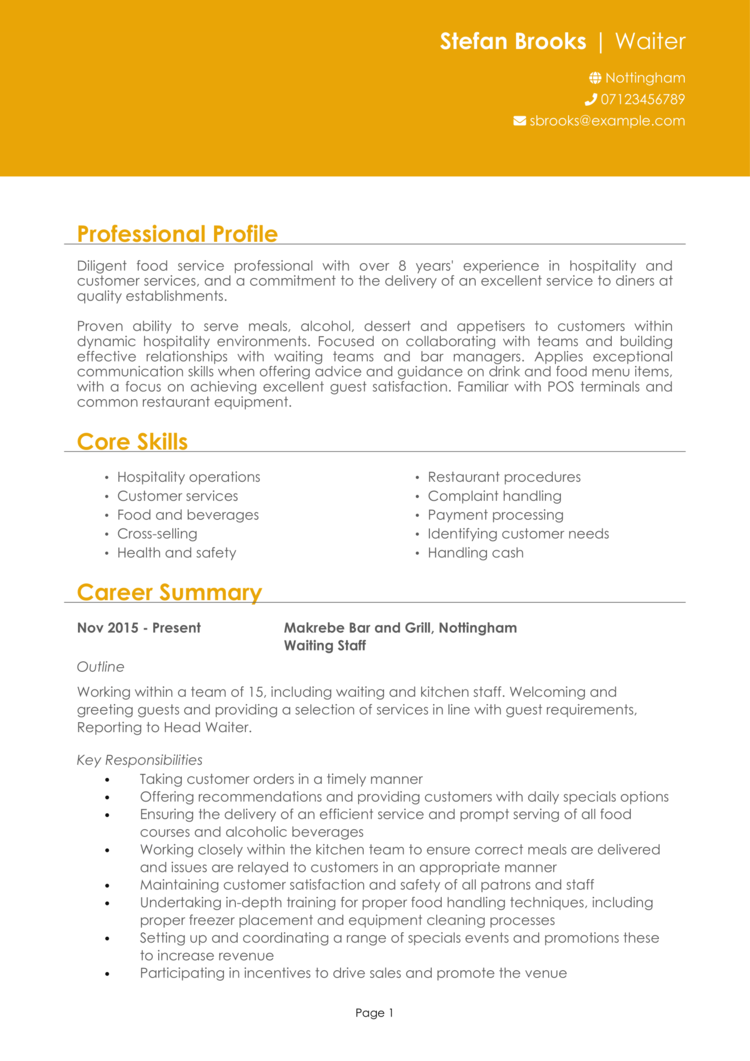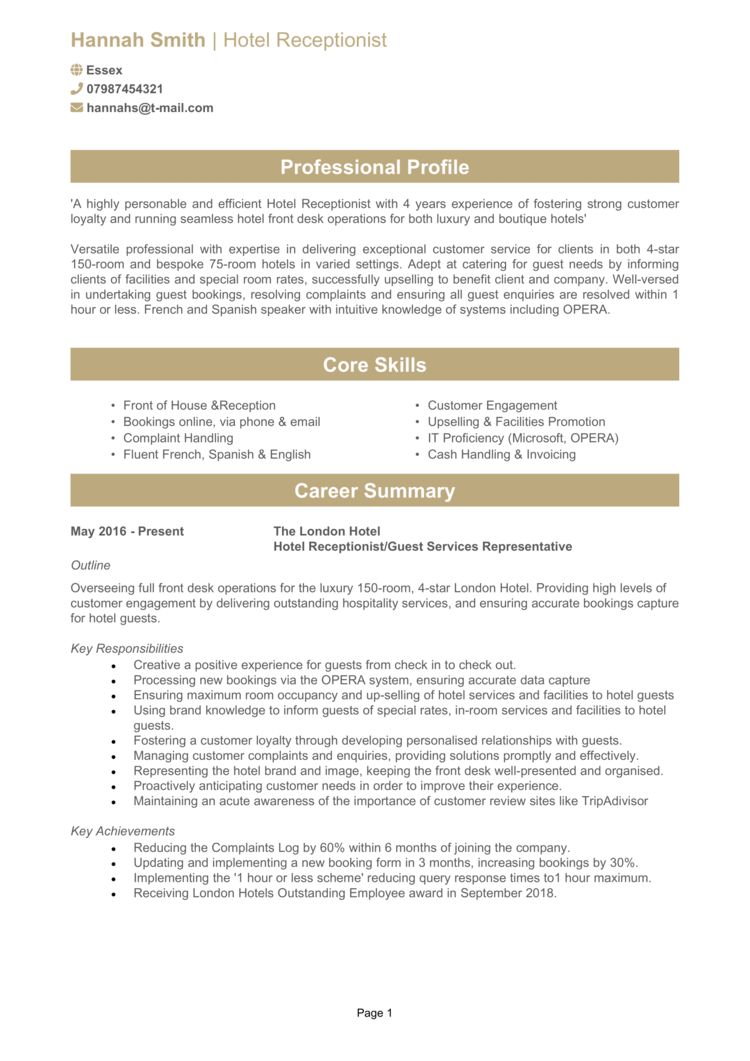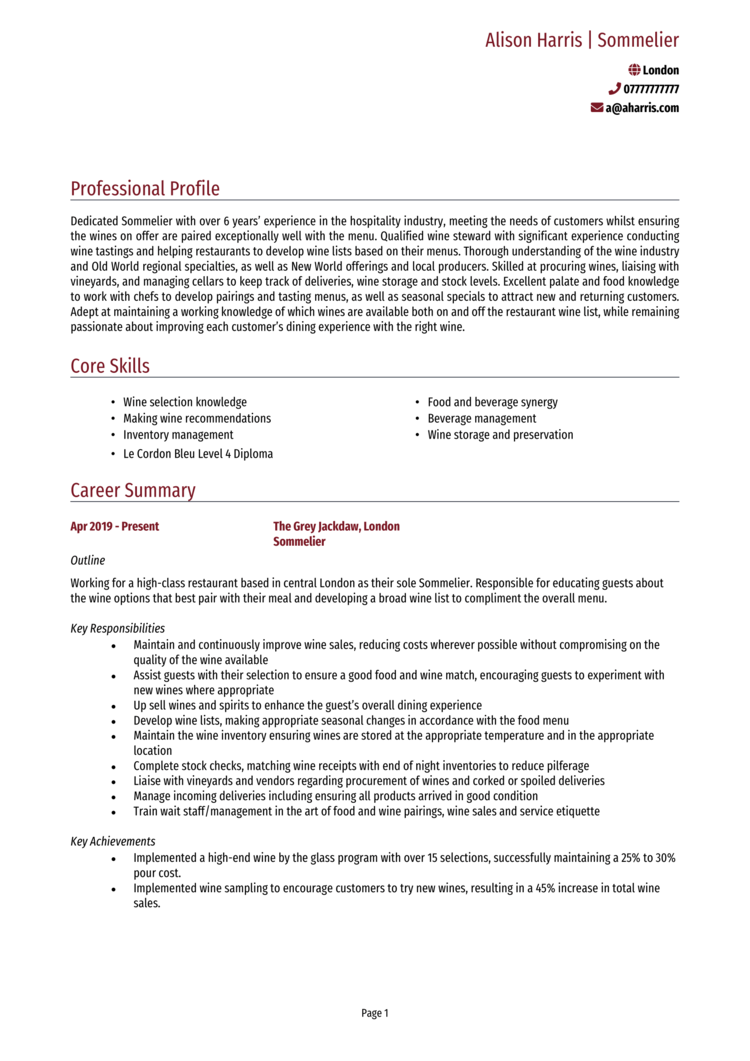Do you have the charm to make every guest feel like royalty and the multitasking skills of an octopus with a clipboard?
Hospitality isn’t just a job – it’s an art. Whether you’re serving fine dining dishes or checking guests into their dream holiday, you’re creating experiences that people remember. But you’ll need a CV that proves you’re ready to thrive in the fast-paced world of hospitality.
This guide, complete with Hospitality CV examples, will help you craft a CV that highlights your people skills, efficiency, and ability to go above and beyond for every guest.
Waiter CV example

Hotel Manager CV example

Restaurant Manger CV example

Hotel Receptionist CV example

Head Chef CV example

Sommelier CV example

Bartender CV example

How to write your Hospitality CV
Learn how to create your own interview-winning Hospitality CV with this simple step-by-step guide.
A Hospitality CV needs to convey your ability to make people feel welcome and solve problems with a smile. From waitstaff to hotel receptionists, recruiters want someone who thrives on making every guest’s experience unforgettable.
This will walk you through writing a CV that showcases your experience, emphasises your customer service skills, and positions you as the go-to candidate for any hospitality role.
How to structure your Hospitality CV


A Hospitality CV should be like the best hotel lobby: inviting, easy to navigate, and full of useful information (just, without the overpriced mini bar). Lazy recruiters need to be able to see the things that make you the candidate they want to hire.
Here’s how to structure your Hospitality CV:
- Name and contact details – Place your name and contact details prominently at the top of your CV for quick access. Adding a photo is up to you.
- Profile – Use this section to summarise your experience, strengths, and what makes you a standout candidate for any hospitality role.
- Core skills – Focus on core skills like multitasking and customer service, making it easy for employers to see your key strengths at a glance.
- Work experience – Outline your career progression in reverse order, emphasising your contributions and key achievements.
- Education – Highlight your academic achievements, such as degrees and hospitality training, that demonstrate your expertise.
- Additional info – Use this optional space for relevant hobbies and interests or personal pursuits that enhance your application.
Hospitality CV format


Your CV’s format should reflect the professionalism and attention to detail you bring to your hospitality role. Even the best hospitality skills won’t stand out if your CV’s layout looks like it was thrown together after a double shift: avoid preventable formatting mistakes!
Here’s how to format your Hospitality CV:
- Bullet points – Break down your key information into skimmable bullet points for quick comprehension.
- Divide sections – Navigating your CV should be easy: structure your CV with distinct sections that make it easy to scan.
- Use a clean font – Stick to a professional, easy-to-read font that reflects your polished approach and keeps the focus on your content.
- Keep it the right length – 2 pages is ideal to provide all the essential information while staying concise and engaging.
Hospitality CV profile


Your profile is your chance to make a brilliant first impression – just like greeting a guest. It should capture your wealth of experience, passion for hospitality, along with your overall dedication to making every moment memorable.
Hospitality CV profile examples
Profile 1
Professional Waiter with three years of experience in high-end restaurants, skilled in providing exceptional customer service and ensuring seamless dining experiences. Adept at managing large sections during peak hours, upselling menu items, and handling customer queries with professionalism.
Profile 2
Organised Receptionist with four years of experience in luxury hotels, focusing on providing a welcoming guest experience. Skilled in handling reservations, managing check-ins and check-outs, and resolving guest concerns efficiently. Proficient in using Opera PMS and Microsoft Office Suite.
Profile 3
Experienced Hotel Manager with over eight years of expertise in leading hospitality teams, improving guest satisfaction, and driving operational efficiency. Skilled in budgeting, staff training, and implementing strategies that enhance hotel reputation and profitability.
What to include in your Hospitality CV profile
Here are some tips on what to include in your Hospitality CV profile:
- Where you’ve worked – Name the sorts of hotels, restaurants, or events you’ve contributed to, and how much experience you’ve got.
- Your top qualifications – Note any hospitality certifications and customer service training.
- Key skills – List key abilities like problem-solving, communication, or handling high-pressure situations.
- People you’ve served – Reference the types of customers you’ve worked with, such as international tourists or VIP clients.
- Service highlights – Mention key achievements, like managing busy shifts or resolving challenging guest issues.
Core skills section


Your core skills section is a quick snapshot of what makes you the best candidate: recruiters should be able to quickly glean the specific, tangible skills that you’ll bring to the role.
For Hospitality roles, this should include a mix of customer service expertise, teamwork skills, and practical abilities. Tailor it to the specific role you’re applying for to ensure it reflects the employer’s needs.
Not sure how to present your hospitality experience?
Top skills for your Hospitality CV
- Customer Service – Providing friendly, efficient, and memorable guest experiences.
- Multitasking – Handling multiple responsibilities, from managing bookings to serving guests.
- Communication – Delivering clear, professional communication with guests and team members.
- Conflict Resolution – Addressing guest complaints calmly and effectively.
- Upselling Skills – Recommending additional services or upgrades to enhance guest satisfaction.
- Cultural Awareness – Understanding and respecting diverse guest needs and expectations.
- Cash Handling – Accurately processing payments and managing till operations.
- Event Coordination – Assisting with event planning and ensuring smooth execution.
- Team Collaboration – Working effectively with colleagues to deliver seamless service.
- Health and Safety Compliance – Ensuring standards are met to maintain a safe environment.
Describing your work experience


Your work experience section is where you demonstrate your hands-on expertise in hospitality. Show recruiters how you’ve contributed to guest satisfaction, managed busy environments, and added value to previous roles.
List your roles in reverse chronological order, focusing on key responsibilities and measurable results.
How to structure jobs

- Outline – Provide an overview of the organisation, your role, and the type of service you delivered.
- Responsibilities – Highlight tasks like managing bookings, supervising shifts, or upselling services. Use action verbs like “assisted,” “coordinated,” or “ensured.”
- Achievements – Showcase measurable results, such as increased customer satisfaction scores, improved team efficiency, or successful event execution. Include figures wherever possible to add impact.
Sample work experience for Hospitality roles
Waiter | Elegant Eats
Outline
Provided attentive and friendly service to patrons in a fine dining restaurant, ensuring a memorable dining experience. Managed tables efficiently during high-traffic periods while maintaining quality service.
Responsibilities
- Presented menus, took accurate orders, and communicated special dietary requirements to the kitchen.
- Served food and beverages promptly and ensured all guest needs were met throughout the meal.
- Upsold wine pairings and specials, contributing to increased revenue.
- Prepared tables for new guests, ensuring cleanliness and attention to detail.
- Resolved customer complaints professionally to maintain satisfaction.
Achievements
- Increased customer satisfaction scores by 15 percent through personalised service.
- Boosted average check value by 20 percent through effective upselling techniques.
- Recognised as Employee of the Month for exceptional service and teamwork.
Receptionist | Grand View Hotel
Outline
Delivered a seamless front desk experience for guests at a luxury hotel, focusing on excellent customer service and efficient operations. Managed reservations, check-ins, and check-outs with precision.
Responsibilities
- Greeted guests warmly and ensured efficient check-in and check-out processes.
- Handled reservations and room assignments using Opera PMS.
- Responded to guest inquiries and complaints, providing timely resolutions.
- Coordinated with housekeeping and maintenance teams to ensure guest satisfaction.
- Maintained accurate financial records for daily cash handling and billing.
Achievements
- Reduced guest wait times by 20 percent through process optimisation.
- Increased positive online reviews by 25 percent with personalised guest interactions.
- Recognised for achieving a 98 percent guest satisfaction rate during peak season.
Hotel Manager | Seaside Haven Resort
Outline
Directed daily operations for a 120-room beachfront resort, focusing on improving guest experiences, staff efficiency, and overall profitability. Led a team of 50 staff members to achieve operational excellence.
Responsibilities
- Developed and implemented strategies to improve guest satisfaction and loyalty.
- Monitored financial performance, ensuring adherence to budgets and cost control.
- Recruited, trained, and managed staff to deliver high-quality service.
- Collaborated with marketing teams to promote the resort and attract new guests.
- Ensured compliance with health and safety regulations across all departments.
Achievements
- Increased annual revenue by 15 percent through strategic marketing initiatives.
- Improved guest satisfaction scores by 20 percent with targeted staff training.
- Achieved a 10 percent reduction in operational costs through efficient resource management.
How to write your education section


The education section is a concise yet vital section which quickly demonstrates the training that underlines the great job you’ll be performing. Whether it’s a degree or an on-the-job certification, this is your chance to showcase your readiness for the role.
List your qualifications in reverse chronological order, starting with the most recent.
Recommended qualifications for Hospitality roles
- Level 2 Certificate in Hospitality and Catering Principles – Core training in hospitality operations.
- Customer Service Level 2 Diploma – Skills in providing excellent customer experiences.
- Food Safety Level 2 Certification – Ensures compliance with hygiene and food safety standards.
- Front Office Operations Certification – Specialised training for hotel reception roles.
- Languages Certification – Fluency in additional languages for international guest interactions.





